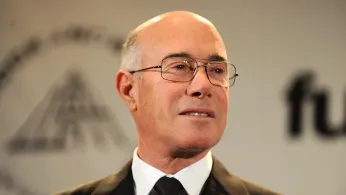
Jul 24
David Geffen Sued by Estranged Husband Donovan Michaels Amid Allegations of Exploitation and Abuse
READ TIME: 3 MIN.
David Geffen, a titan of the entertainment industry and one of the most influential openly gay figures in media, is embroiled in a high-profile legal dispute with his estranged husband, Donovan Michaels. The lawsuit, filed this week in Los Angeles Superior Court, alleges that Geffen engaged in a pattern of exploitation and emotional abuse, culminating in Michaels’ eviction and financial isolation following Geffen’s initiation of divorce proceedings earlier this year .
According to court filings, Michaels—legally known as David Armstrong—claims that Geffen made explicit assurances of lifelong financial support, only to renege on these promises after the breakdown of their relationship. Michaels further accuses Geffen of controlling behavior, including the orchestration of their financial arrangements and the imposition of isolation, which allegedly intensified after Geffen filed for divorce in May 2025 .
The couple’s relationship began in 2016, when Michaels, then 19, met Geffen, then 73, through the website SeekingArrangements.com—a platform where affluent individuals often connect with younger partners . According to the lawsuit, their initial interactions were transactional, with Geffen allegedly paying Michaels $10,000 for their first night together . However, Michaels asserts that the relationship soon evolved into a committed partnership, marked by global travel, luxury real estate purchases, and what he believed to be a deep emotional connection .
Michaels, who experienced instability and trauma growing up in the foster care system, has stated that he was drawn to Geffen’s promises of security and belonging. He describes the relationship as one where the disparity in age, wealth, and social power played a significant role in shaping the dynamics between them .
The suit details a series of alleged abuses, including emotional manipulation, coercive control, and isolation from friends and outside support networks. Michaels claims that Geffen used his financial power to dictate the terms of their relationship, citing instances where access to resources and even housing was contingent on compliance with Geffen’s wishes . The suit further alleges that following the divorce filing, Geffen abruptly evicted Michaels and cut off all financial support, despite prior assurances of lifelong care .
In addition to claims of financial exploitation, Michaels’ lawsuit levels accusations of “salacious sex and drugs” on Geffen’s superyachts, painting a picture of a high-profile lifestyle that, according to Michaels, masked more troubling patterns of control and abuse .
The case has ignited intense public debate, particularly within LGBTQ+ communities, about the visibility and scrutiny of queer relationships in the media spotlight. Legal experts note that the absence of a prenuptial agreement between Geffen and Michaels could have significant ramifications for the outcome of the suit, especially given the considerable disparity in their financial means .
Advocacy groups have called for respectful reporting and recognition of the complexities involved when LGBTQ+ relationships become the subject of high-profile litigation. Some have also highlighted the need for broader conversations about economic power, consent, and vulnerability within relationships that cross generational and socioeconomic lines.
While the details of the Geffen-Michaels case are unique, the underlying issues resonate widely. Many in the LGBTQ+ community see the lawsuit as a reminder of the challenges that can arise when relationships are shaped by significant power imbalances. The case has prompted renewed calls for legal reforms and community education focused on protecting vulnerable individuals, ensuring equitable partnerships, and supporting survivors of intimate partner abuse—regardless of gender identity or sexual orientation.
As the legal process unfolds, both parties have retained high-profile attorneys, and the case is expected to draw ongoing attention due to Geffen’s cultural prominence and the sensational nature of some of the allegations. Neither Geffen nor his legal team have issued a public statement addressing the specific claims as of this writing .
The outcome of this case may set important precedents for how courts address promises of support, power dynamics, and exploitation in LGBTQ+ relationships—underscoring the ongoing need for inclusive legal protections and community solidarity.






